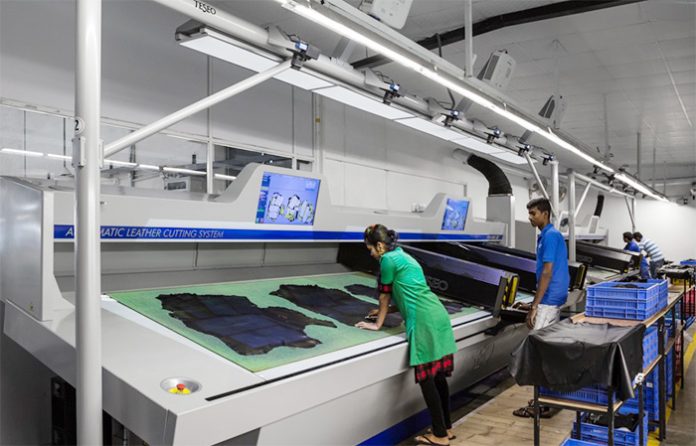Manufacturing high quality leather goods since 1982; claims that the country remains the top spot for investors
When Sri Lanka opened its free trade zones in Katunayaka, Biyagama and Koggala in the mid-1970s and 1980s, the country’s unique geographic location proved to be the greatest advantage for would-be foreign investors, who saw immense potential in the tiny island. As one of the first countries to set up FTZs in the South Asia region at the crossroads of major shipping routes to South Asia, the Far East, Europe and the Americas, major shipping lines and air freight services used Sri Lanka as a convenient port of calls en route to the main commercial centers.
Lanka Leather Fashion (Pvt) Limited was among the investors who recognized the potential of Sri Lanka and was one of the first to open operations in the Katunayake Free Zone in 1982. As the oldest leading manufacturer of high quality leather garments, he was Director of Lanka Leather Mode Marco Weidemann recalls his father’s founding in Sri Lanka with irrepressible conviction as Sri Lanka had no import or export restrictions and functioned well within a liberalized trade economy.
“The talent pool in the 1980s and the high literacy rate compared to other regions were the other advantages that also meant a win-win formula for Sri Lanka and our company,” says Marco Weidemann. “We were able to help meet the high demand for jobs, while the Sri Lankan workforce, macro operating environment and strategic location provided the basis to operate a large manufacturing facility that met the high standards of the European fashion industry.”
Director Duncan Fraser adds: “Manufacturing in neighboring countries such as India and Pakistan was not an option for Lanka Leather Fashion as FDI was not favored in these regions. However, we have worked towards a seamless supply chain by sourcing our leather from these countries and manufacturing our products in Sri Lanka. Since Sri Lanka had less bureaucracy compared to the rest of South Asia, it made sense for us to set up offices given our proximity to the leather sourcing regions.”
However, the war began a year later and dragged on for three long decades during which, according to Marco Weidemann, financial and manufacturing companies, including foreign direct investment, were left alone to continue their businesses. Being so close to the port and airport, they would never have been afraid of not fulfilling orders as the whole process from sourcing to shipping was carried out without interruption.
Lanka Leather has been manufacturing quality leather garments since 1982
“Sri Lanka has generally been fully supportive of operating companies, but successive governments have made ad hoc policy decisions and continually changed tax structures, which is not good from an FDI perspective. Any foreign direct investment requires stability and continuity, and these are two priorities that any government should consider when approaching foreign direct investment.”
“Marco Weidemann continues to be absolutely confident and optimistic about Sri Lanka. “The main reasons we are here have not changed.”
Some of the country’s strong advantages remain, including the workforce and its education, easy access to markets, and the ease and efficiency of importing and processing raw materials. Even with price hikes across the logistics industry during the pandemic, which was a global crisis, and the recent economic crisis in Sri Lanka, manufacturers continue to operate unhindered.”
He added that the government’s taking precautions to ensure smooth operations for exporters by offering the ability to buy diesel directly from oil companies in USD boosts the company’s confidence in operating in Sri Lanka.
With a workforce of 650 employees and notwithstanding the unprecedented challenges Sri Lanka was going through, Lanka Leather retained its workforce, paid full compensation and awarded full bonuses. “We recognize that rising inflation is leading to a significant increase in the cost of living.” To alleviate some of our employees’ daily woes, including obtaining basic necessities, we have introduced a cost-of-living allowance each month above base salary and transportation solutions added to ensure they can report to work.”
As Sri Lanka continues to engage in an uphill battle to achieve economic stability and strengthen social skills, it is foreign investors who have seen the country’s promise and stayed put for decades who will write this token of confidence on Sri Lanka’s behalf. The country is not just about a strategic location, but also about a higher literacy rate and a highly skilled workforce, and as Lanka Leather Fashion said, “It is really gratifying to be able to run operations smoothly despite a difficult environment.”
island.lk
http://island.lk/colorup-roof-tiles-revolutionizing-roofing-in-sri-lanka/






![7 Best Home Appliance Insurance Companies [current_date Format=”year”]](https://www.serviceindustrydailynews.com/media/2024/01/7-Best-Home-Appliance-Insurance-Companies-current_date-Formatyear-218x150.jpg)








